
- Associate Dean, Teacher Education message
- Primary/Junior Program
- Junior/Intermediate Program
- Intermediate/Senior Program
- ASPIRE - Additional Qualifications
- How to Apply
- Current Teacher Ed Students
- Contact The Teacher Ed Office
- Master of Arts
- Master of Professional Education
- Doctor of Education
- Doctor of Philosophy
- Current Graduate Students
- Contact The Grad Office
- Teacher Education
- Graduate Education
- International Baccalaureate
- Strategic Plan
Transforming education, transforming lives.
Strategic plan 2022-2028

Land Acknowledgement
- Mission, Vision, Values
Towards Western at 150
Strategic pillars, consultation.
Western University is situated on the traditional territories of the Anishinaabek, Haudenosaunee, Lunaapeewak and Chonnonton Nations, who have longstanding relationships to the land and region of southwestern Ontario and the City of London. The local First Nation communities of this area include Chippewas of the Thames First Nation, Oneida Nation of the Thames, and Munsee Delaware Nation. This land is also connected to London Township and Sombra Treaties of 1796 and the Dish with One Spoon Wampum.

Our Mission
The Faculty of Education will transform education and transform lives by leading and contributing to teaching excellence in research-intensive academic and professional programs, and through world-class research that produces measurable and high-quality social impact that benefits society. We are committed to enhancing equity and accessibility for all learners, and culturally and socially responsive knowledge brokering and mobilization.
We are guided by the values of excellence, integrity, equity, belonging, kindness, and social justice.
The Faculty of Education’s 2022-28 Transforming education, transforming lives strategic plan pillars are aligned to the pillars of Towards Western at 150 and select UN Sustainability goals .
Education's place in the world
Indigenous education is sui generis (a thing of its own kind), people, community, culture, and belonging, professional pathways and academic excellence, research impact.
This strategic plan is an outgrowth of extensive listening circles across our stakeholder groups. It represents the voices and the aspirations of our community:
Stakeholders
- All members and representatives of the Faculty of Education's Faculty Council
- Dean's Advisory Committee (Associate Dean, Teacher Education; Associate Dean, Graduate Education; Associate Dean, Research)
- Director of Indigenous Education
- Education Graduate Student Association Leadership
- Education Student Council Leadership
- Faculty of Education Academic Program Chairs
- Faculty of Education Executive Committee
- Faculty members in the Indigenous Education Office
- Faculty members of the Applied Psychology Academic Research Cluster
- Faculty members of the Curriculum Studies and Studies in Applied Linguistics Research Cluster
- Faculty members of the Critical Policy, Equity, and Leadership Studies Research Cluster
- Staff, students and faculty at the Strategic Planning Town Hall
- Teacher Education Liaison Committee
Help us transform education, transform lives
To donate, contact:
Rosie Triebner, CFRE
Director, Community Engagement & Development
519-661-2111 ext. 87643 | [email protected]
News and Events
Support Services
Social Media
University Strategic Plan

Icon Navigation
- Planning & Timelines
- Committee Work
- Suggestion Box
Engagement Numbers
1000+ Engagement Responses
Over 800 Listening Session Registrations
22,668 Website Pageviews
24+ Listening Sessions
Taking action to dismantle the structural and cultural barriers that stand in the way of "so that all may learn" requires us to be a responsive university that actively prepares for the future ahead. WMU is committed to improving access to learning opportunities by fostering a supportive University environment and culture while providing a relevant education with a robust return on investment. This means cultivating a student-centered growth mindset that is focused on developing 21st-century transferable knowledge, skills and aspirations. In turn, our students are equipped to make a positive impact on the world as well-rounded, global citizens.
Western's new Strategic Plan 2022-32 will cover a span of 10 years and is framed around seven key priority areas; Academic Excellence, Community Building, Diversity, Equity and Inclusion, Internationalization, Research and Creative Scholarship, Sustainability and Well-being. This plan serves as a guide for University strategic investment and decision making, while incorporating a 3-4-3-year plan evaluation structure that enables us to respond to changes in our environment and to evolve our process as milestones are reached.
Moving forward, University leadership will be responsible for using this Strategic Plan as a roadmap for implementing targeted initiatives to achieve these institutional goals within their own areas of influence. Meanwhile, our campus will begin to develop action plans that refine our strategies and metrics of success.
The future of WMU depends on the collaboration of our entire community and the shared commitment to build upon our strengths, seize our opportunities and pursue our aspirations.
The University strategic plan website will continue to provide progress updates throughout the implementation process. There you can learn more and discover how you can get involved.
You are using an outdated browser. Please upgrade your browser to improve your experience.

Members of the Strategic Planning Steering Committee are proud to share Western’s new strategic plan and invite you to join in creating a bolder, brighter future.
Western has an impressive track record of success – achievements we take pride in and that have paved a road towards an even brighter, bolder future.
As we look towards our 150th anniversary in 2028, we are energized and ready for greater impact. We will educate, support, and encourage leaders who think and act boldly in response to the grand challenges of our time – to serve the public good.
As we chart an innovative path over the next 150 years, we will build a university more energized, more influential, and more inclusive than ever before.
Download the plan (PDF, 12mb) Introducing the Plan Progress Update
After a broad consultation process in 2020-2021, Western’s Strategic Plan Steering Committee identified three overarching themes.
Greater Impact
Western is ready to do more and be more.
People, Community, and Culture
We will build a more inclusive Western where everyone thrives through belonging.
Western's Place in the World
We will renew our campus, strengthen our partnership with London, create a more sustainable future, and engage the world.
Our Plan in Action
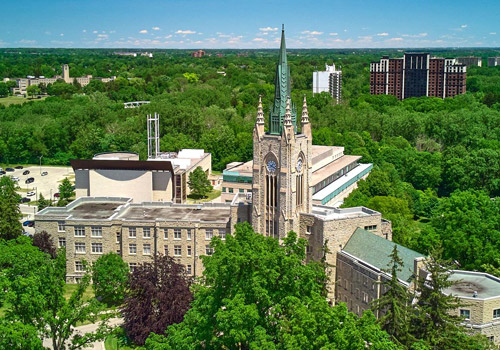
Western invests $6 million to support new EDI initiatives

Planting the seeds of sustainability
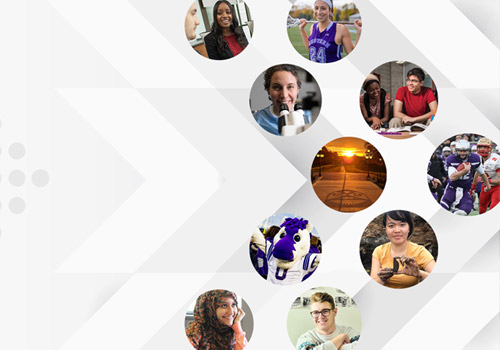
A bold future together
All Strategic Plan stories on Western News
About our Planning
From September 2020 to April 2021, Western engaged students, faculty, staff, alumni, and community partners in developing this plan. Through interactive Zoom sessions, online surveys, and written submissions, we received more than 3,700 inputs. Thank you to the 37-member Strategic Plan Steering Committee for this important work.
Previous Strategic Plans
Achieving Excellence on the World Stage (2014) - 1.16mb, PDF
Update to Engaging the Future (2010) - 91.7kb, PDF
Engaging the Future (2007) - 7.08mb, PDF
Making Choices (2001)
Leadership in Learning (1995)
Land Acknowledgement
Western University is located on the traditional lands of the Anishinaabek, Haudenosaunee, Lūnaapéewak, and Chonnocton (Neutral) peoples. The Huron-Wendat peoples also have a history of living in this territory. In the London area, there were Treaty 6 London Township, Treaty 7 Sombra Township, and Treaty 21 Longwoods. This land continues to be home to diverse Indigenous Peoples (First Nations, Métis and Inuit) whom we recognize as contemporary stewards of the land and vital contributors to our society. By recognizing First Nations peoples’ relationships to land, we make explicit Indigenous Peoples’ presence and rights to self-determination.
Western's comprehensive social media directory
Western University
Office of the President 1151 Richmond Street London, Ontario, Canada, N6A 3K7 Tel: 519-661-3104 | Contact Us
Privacy | Web Standards | Terms of Use | Accessibility


Strategic Planning
Our strategic plan, the purpose.
Strategic Planning evolves from collaborative engagement with the campus, local, and regional communities to articulate a shared mission, vision, and set of values that drive all decision-making at Arizona Western College. The Strategic Plan that develops out of this process is dynamic and provides a flexible but focused framework for our future.
The History
In November 2016 AWC President Dr. Daniel Corr launched a 15-month Strategic Planning Initiative. He worked with the Classified Association, Faculty Senate, and the President's Cabinet to select Biridiana Martinez, Ellen Riek, and Lori Stofft as tri-chairs for this process. Dr. Corr gave only two directions for the tri-chairs: make the strategic planning process inclusive, and make it transparent. Research into successful strategic planning at other institutions and preliminary discussions with consultants revealed that we should develop a Task Force with balanced representation from our three employee groups, to collaborate with President's Council and AWC students to drive our Strategic Planning process.
View Archive
Innovation Fund
In 2017 Dr. Corr and The District Governing Board launched the inaugural Innovation Fund to support the development of AWC initiatives aligned with Strategic Planning. This year, $80,000 in funds are available for one-time projects beginning in Spring 2022 that support Strategic Planning efforts, specifically projects that align with AWC’s Mission, Vision and Values. This limited time funding is designed to encourage innovative thinking outside the parameters of the annual fiscal year budget.
Latest News
October 2021 Innovation Fund Update
September 2020 Arizona Western College hosted a press conference at the Parker Learning Center on Thursday, September 10, to share about expanding partnerships with regional law enforcement and funding from Arizona@Work to enroll cadets in the college’s Law Enforcement Training Academy (LETA).
June 2020 We hosted the 2nd in a series of college-wide convenings (AWC Teams Streamline: Stop to Reinvent) with Liz Murphy, from CampusWorks Inc, to talk about how our teams can learn from the COVID-19 Pandemic and streamline their work to better serve our students.
May 2020 Over 120 colleagues joined us to at the Stopping to contemplate the early lessons of this huge shift in the work we do.
March 2020 In March, days (minutes?) before the shut-down, about 40 colleagues gathered for an Implementation Council meeting, to talk about how to streamline and collapse the list of 19 objectives, and to engage in conversation about our Values. We discussed how to set our teams up for success and completion on the Objectives, the need to remove barriers, the desire to ap new talent to the Implementation teams.
October 9, 2019 AWC staff seek professional development on Strategic Planning work
July 25, 2019 2019 Strategic Planning Status Report
December 6, 2018 2019 Innovation Fund Awards Announced
November 13, 2018 Pathways Framework Adopted
May 03, 2018 Strategic Innovation Projects in the Works Across District
February 26, 2018 Arizona Western College Unveils Strategic Plan: Technology, Agility, and Baccalaureate Degrees at the top of the list
May 02, 2018 AWC Governing Board approves a preliminary budget
February 27, 2018 Student-Focused Innovation Projects Bring Great Ideas to Life Across District
Strategic Planning Documents
Newsletters, implementation team work, disaggregated data party documents.
In June of 2019, members of the AWC Pathways committee, now the Pathways Charter Team, attended the inaugural Arizona Center for Student Success convening in Tempe. Representatives from all 10 Arizona community colleges gathered to discuss successful Guided Pathways models at colleges outside of Arizona, collaborate on best practices, and share next steps for statewide Pathways initiatives moving forward. The plenary speaker was Kay McClenney, Senior Advisor to the president of the American Association of Community Colleges. McClenney congratulated participants on their willingness to do the deep work of building Guided Pathways at our home institutions, recognizing that the historically piecemeal approach to providing support for student retention and completion has yielded less than impressive results. Rather, she suggested, we need to adopt a holistic approach that shifts us away from asking if students are ready for college and toward creating colleges that are ready for students.
Certainly any approach we adopt should be data-driven, and she challenged each of us to ask questions of our institutional data that perhaps we had not asked before. These questions begin to address some of the systemic issues our students experience that hinder their ability to easily navigate an academic path. When our Charter Team returned to AWC and met to debrief the convening, these questions continued to resonate with us. Thus the Disaggregated Data Party was formed! We sent our IERB office a data request focused on the questions McClenney asked, and planned a Friday morning in late September when faculty and staff serving on a variety of Strategic Planning committees could come together to review and analyze the data, and set some goals based on what we found.
Over 50 faculty and staff participated in this Data Party on Friday, September 27, 2019, 9am-noon, and took a deep dive into the data. In many cases what we learned was that we need more data! In other cases, we took issue with how a question was framed—what it implied or didn’t that skewed the results. Sometimes we were just generally surprised at what we found. In all cases, as our post-Data Party survey responses indicate, we agreed that working together—across departments, programs, and employee groups—should be at least an annual exercise.
If you have any questions as you peruse the slides that helped drive our process, the raw data, or the results, please contact [email protected]
Strategic Direction
Cultivate an agile culture and institutional model that strengthens the future of AWC and the region
- COMPLETE - Establish an equitable model of shared governance that builds a culture of empowerment by minimizing hierarchy and broadening decision making. January 2019
- Review processes, procedures, and policies to improve efficiency and create sensible workflows to increase student and faculty/staff satisfaction. July 2019
- Design a cross-training model to support collaborative staffing resource flexibility. July 2019
- Create and fund a professional development model to grow bench strength and assist with succession planning. January 2020
Improve student success by leveraging technology that personalizes the student experience and increases organizational effectiveness
- Deliver upgraded technology that increases automation in Student Services. July 2022
- Develop a stable, well-supported, technology-rich teaching and working environment dedicated to current and equitable technological resources. August 2022
- COMPLETE - Eliminate negative IT audit findings. December 2020
- Develop a technology-literate workforce that embraces IT as a component to improve responsiveness, efficiency, pedagogy, and student learning. August 2021
- Deliver upgraded technology that reflects best-practices in teaching and learning and supports an enriched student experience. August 2022
ACCESSIBILITY
Eliminate cultural, financial, time and place barriers to education
- COMPLETE - Develop and implement a multiyear data-driven class schedule that aligns with program offerings and transfer/ workforce demands to increase enrollment by 5% at all campuses. June 2020
- COMPLETE - Offer open educational resources in 50% of all classes. July 2022
- COMPLETE - Allocate appropriate resources to meet the growing community and educational needs in South County and other district priorities as identified by the Facilities Master Plan. January 2025
- Develop and deliver “wrap-around” services that accelerate student time to completion. January 2022
- COMPLETE - Research and adopt a Guided Pathways model that aligns with AWC student & community needs. November 2018
- Develop a partnership with the high school district to design and deliver aligned developmental curriculum at the High School level to reduce barriers to college-level courses. June 2020
Grow and sustain academic programs that leverage our competencies, fuel economic growth and position graduates for prosperity
- Create regional economic growth by collaborating with key business and industry partners to develop programs tailored to meet the existing employee deficit. January 2020
- Develop and deploy three interdisciplinary programs that t local industry needs using flexible delivery models. June 2020
- COMPLETE - Explore learning processes to obtain credits based on experience, skills, and prior learning. July 2019
- COMPLETE - Develop Institutional Learning Outcomes (ILOs) for all AWC students. October 2018

AGILITY – We welcome change, anticipate stakeholder needs, identify flexible, innovative solutions, adapt to meet constituent needs, and are process focused.
PASSION – We dream big, propose creative solutions, exceed expectations, and foster an engaging and supportive environment.
TRANSPARENCY – We build trust through honesty and openness, include stakeholders in decision-making, and communicate thoughtfully and clearly.
UNITY – We collaborate to develop and achieve goals, find opportunities to create synergy and empowerment, and work holistically toward student success.
EMPOWERMENT – We are inspired to do our best work when governance and responsibility are shared equitably, individuals are encouraged to express diverse and innovative perspectives, and courage is esteemed over comfort.
RESPECT – We express the highest levels of professionalism and kindness, seek common ground with openness & inclusivity, challenge ideas with an empathetic mindset, and listen to and acknowledge others’ ideas with civility and courtesy.
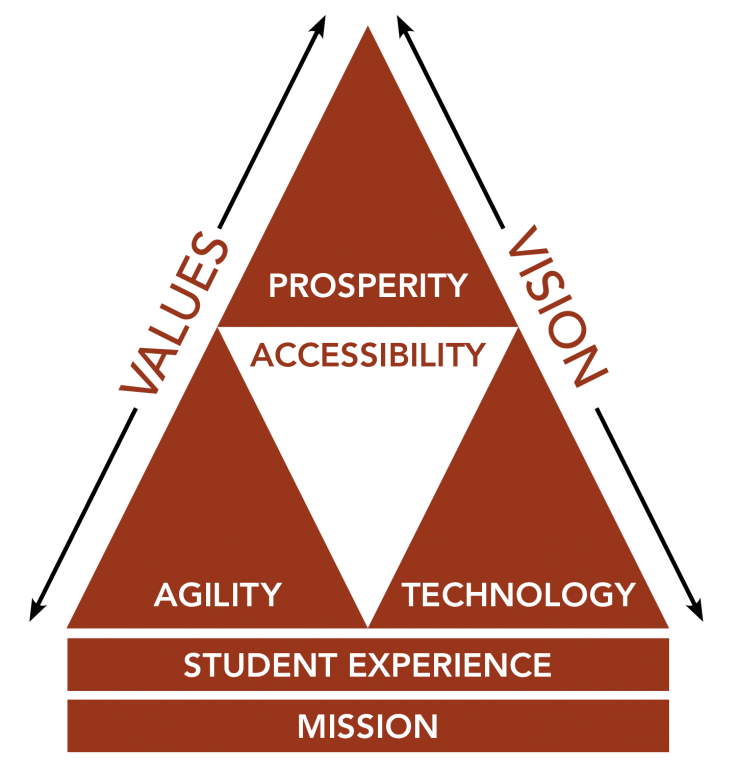

Have a question?
Contact us, call us.
Phone: (928) 317-6250
Email Us
Hours
Monday - Thursday: 7:00am - 5:00pm
An official website of the United States government
Here's how you know
Official websites use .gov A .gov website belongs to an official government organization in the United States.
Secure .gov websites use HTTPS. A lock ( Lock Locked padlock ) or https:// means you've safely connected to the .gov website. Share sensitive information only on official, secure websites.
Document Library sub navigation
- All Documents
- National Center for Science and Engineering Statistics (NCSES)
- Obtaining Documents
- Search Documents
- Document Library
Leading the World in Discovery and Innovation, STEM Talent Development and the Delivery of Benefits from Research - NSF Strategic Plan for Fiscal Years (FY) 2022 - 2026
For more information about file formats used on the NSF site, please see the Plug-ins and Viewers page.

An official website of the United States government
Here’s how you know
Official websites use .gov A .gov website belongs to an official government organization in the United States.
Secure .gov websites use HTTPS A lock ( Lock A locked padlock ) or https:// means you’ve safely connected to the .gov website. Share sensitive information only on official, secure websites.
JavaScript appears to be disabled on this computer. Please click here to see any active alerts .
Office of Research and Development Strategic Plan

EPA’s Office of Research and Development (ORD) released Strategic Plan guides its mission and ensures that the Agency and our partners have the scientific knowledge, data, and tools needed to protect people and the planet from the most complex and challenging environmental issues of our time.
- ORD Mission
- EPA Foundational Principles
- ORD Principles
- ORD Strategic Goals

ORD Mission
Providing the best available environmental science and technology to inform and support human health and environmental decision making for federal, state, Tribal, local, and community partners, addressing critical environmental challenges and anticipating future needs through leading-edge research.
Leading the world in environmental science, technology, and research, developing breakthrough solutions that enable EPA, federal agencies, states, Tribes, and communities to protect human health and the environment.
EPA Foundational Principles

E PA’s foundational principles form the basis of the Agency’s culture and guide its operations and decision making now and into the future. They are:
- Follow the Science
- Follow the Law
- Be Transparent
- Advance Justice & Equity
ORD Principles
In conducting the critical research that informs and enables the safeguarding of our nation’s health and environment, ORD staff are guided by the following principles:
- We are environmental stewards. I take action to care for and ensure a healthy and thriving environment now and in the future.
- We are an organization of scientific excellence that informs environmental decisions. I diligently use all my talents to contribute significantly to our goals and to fulfilling our mission.
- We actively seek out partnerships that advance the quality, relevance, and impact of ORD’s solutions-driven research. I actively look beyond my own areas of expertise to see how my contributions combine with those of others to fulfill ORD’s mission.
- We exhibit leadership and ownership. I am responsible for developing and exhibiting my leadership.
- We trust each other and are worthy of each other’s trust. I am mindful of others’ trust in me, and I always behave with integrity.
- We communicate honestly, openly, and clearly. I seek the information I need and provide the information that others need in support of a culture of open communication.
- We enable decisions at the most local level possible. I am responsible for actively seeking opportunities to engage others in decision making.
- We value the talents, skills, and experiences of our diverse workforce. I seek to understand, appreciate, and engage others’ unique talents, perspectives, and contributions.
- We are accountable to others for our actions. Forever mindful that our work serves a public trust, I am dedicated to fulfilling our commitments and making the most of our resources.
- We recognize and celebrate our accomplishments. I always recognize and celebrate others for a job well done.
ORD Strategic Goals

ORD has identified four overarching goals to guide its work. The goals are:
- Goal 1: Advance Science and Technology Improve protection of human health and the environment through scientific advancements, innovative research, and technology development using systems-level approaches.
- Goal 2: Support Decision Making Deliver the scientific and technical information our partners need to inform their decisions to protect human health and the environment.
- Goal 3: Build a Healthy Workforce and Organization Strengthen and sustain a workforce and organization that have the skills and expertise necessary to anticipate and respond to current and future challenges to human health and the environment and that value inclusivity.
- Goal 4: Be a Trusted Scientific Source Serve as a trusted source of scientific information for the Agency, the nation, and the world.
Learn More about ORD's Goals and Objectives
ORD has articulated clear and achievable objectives to guide, measure, and meet the four goals outlined above. Learn more about ORD's Goals and Objectives .
- EPA Research Home
- Research Topics
- Publications
- Funding & Career Opportunities
- Stay Connected
- EPA Research Events
- About Our Research
- Science Models and Research Tools (SMaRT) Search
- Strategic Research Action Plans Fiscal Years 2023-2026

Introducing Carolina’s Strategic Research Roadmap
By Carleigh Gabryel
UNC Research is charting a course to grow Carolina’s research enterprise and continue enabling its success with a new strategic roadmap.
A message from the Vice Chancellor for Research:
Dear Carolina,
Our University stands among the world’s most impressive research institutions, and we are poised to propel it even further. Today, we are unveiling the Carolina Strategic Research Roadmap – a bold, actionable plan to solidify our position as a global research leader and drive greater impact and achievement.
The Strategic Research Roadmap provides the blueprint that will allow us to foster a more nimble, innovative, and entrepreneurial research environment driven by three guiding principles: innovate, transform, and renew.
This is the culmination of a year-long effort led by the Office of the Vice Chancellor for Research to gather insights from key stakeholders across campus, including University leaders, deans of schools and research units, directors of pan-campus centers and institutes, and faculty members deeply involved in research activities. Together, we worked to identify areas of strength, opportunities for improvement, and strategies to amplify Carolina’s research impact, which is synergistic with other efforts being led by the Chancellor, the Provost, and other vice chancellors.
The results of that engagement and collaboration have yielded a new strategic vision that will help us continue to grow and strengthen our research infrastructure, address areas of concern, and build upon our existing strengths.
Research Roadmap Goals
Three strategic goals will enable us to propel our research enterprise to new heights:
- Goal #1: Build, improve, and maintain state-of-the-art research facilities, equipment, data, and technology to enable success.
- Goal #2: Grow Carolina research by identifying and investing in strategic opportunities, leveraging existing research strengths, and fostering collaboration to discover new knowledge and address challenges.
- Goal #3: Increase the impact and translation of Carolina’s research and communicate its value.
In addition, there are two key operational imperatives necessary to support the three strategic goals:
- Imperative #1: Support and grow a talented research workforce that ensures Carolina continues to excel in research that serves our state and the world.
- Imperative #2: Foster an environment that facilitates efficient research processes and promotes integrity, objectivity, and quality of research outputs.
As we move into the next phase of implementing the Strategic Research Roadmap, we will form working groups tasked with developing plans to achieve each of the goals and operational imperatives. In the coming weeks, individuals will be invited to join those committees based on their experience and position within the University, ensuring we have appropriate representation from across campus.
If you are invited to participate, we hope you will consider applying your talents, knowledge, and time to these efforts. Together, we can create an even greater research enterprise that fulfills the University’s missions to teach the next generation of leaders and providing crucial service to the state, the nation, and the world through new discoveries, revolutionary technologies, and life-saving treatments.
Penny Gordon-Larsen, Vice Chancellor for Research
Lee H. Roberts, Interim Chancellor
J. Christopher Clemens, Provost
NAI Strategic Planning Blog
Updates blog.
April 1, 2024- Launch Celebration to take place at NAISA's 3rd Annual Traditional Spring Pow Wow
After two years of intentional planning, we are thrilled to announce the official launch of Northwestern University's Native American and Indigenous (NAI) Strategic Plan. This plan marks a significant milestone in our ongoing commitment to honoring Native and Indigenous voices and fostering an inclusive campus environment. The plan outlines key priorities over the next three years, including investing in human, space, and financial resources, enhancing Northwestern's leadership efficacy and capacity, creating university-wide knowledge grounded in Native American and Indigenous perspectives, expanding partnerships with Tribal and Indigenous communities, and increasing support for Native American and Indigenous students. The framework will be based in the pedagogical teachings of the jiimaan (birch bark canoe) and grounded in the reciprocity gift exchange that took place between President Schill and the Northwestern Indigenous community during his inauguration in June of 2023. This plan is not just a document; it's guidance towards action, a blueprint for how we can all contribute to a more inclusive and vibrant Northwestern. We invite you to be part of this journey. Join us as we unveil the strategic plan at the Native American and Indigenous Student Alliance’s (NAISA) Third Annual Pow Wow on Saturday, April 27th from 12pm to 5pm at the Welsh-Ryan Arena. This is an opportunity to learn more about the strategic plan, our goals, and how you can get involved. Together, we can create space where Native American and Indigenous people are heard, their identities and ways of being and knowing are honored, their intellectual work is valued, and where they can thrive as valued members of our community.
January/February 2024- Hosting a series of Roundtables
The Native American & Indigenous Strategic Planning Committee has developed five key priority goals and is excited to engage with units across the University to review the strategic planning focus and process, and dive deeper into the key five areas of our plan. These areas are:
- INVEST IN HUMAN, SPACE, AND FINANCIAL RESOURCES TO SUPPORT STRATEGIC PLAN
- ENHANCE NU LEADERSHIP EFFICACY AND CAPACITY
- CREATE NU-WIDE KNOWLEDGE AND PROGRAMS GROUNDED IN INDIGENOUS KNOWLEDGE AND SELF-DETERMINATION
- RESOURCE AND DELIVER ON PARTNERSHIP WITH TRIBAL COMMUNITIES
- INCREASE SUPPORT AND ENGAGEMENT OF NATIVE AMERICAN AND INDIGENOUS STUDENTS AT NORTHWESTERN, INCLUDING PROSPECTIVE STUDENTS, CURRENT STUDENTS AND ALUMNI.
Roundtables:
Our next step in this process is to hold a series of roundtables. During each roundtable discussion, different units and stakeholders will be diving into specific goals that are key to their areas. We will also be holding general sessions open to all for each individual goal. Participants will have an opportunity to consider how each of these key focal areas is conceptualized, particularly through conversations about hopes and aspirations in each of these areas.
During these roundtables, we share an update on the overall planning process and timeline before we ask the following set of questions:
- What are some actions that NU can take to demonstrate leadership within these goals?
- What openings and connections with your current initiatives can be expanded, or new activities you can imagine, that your unit could engage in to support the goals?
- What barriers, challenges, or worries come to mind in accomplishing the goals? What strategic advice do you have in navigating these barriers and challenges?
- What support and relationship(s) does your unit need to successfully engage in implementing the goals and commitments to Indigenous strategic plan? From/with Native & Indigenous Affairs (NAIA)? Who in your unit can serve as a liaison to NAIA?
Below is the schedule for general goal-specific roundtable. Anyone can join these virtual sessions so we encourage you to register to join us:
Monday, January 29, 2024; 3-3:45pm : GOAL 1: INVEST IN HUMAN, SPACE, AND FINANCIAL RESOURCES TO SUPPORT STRATEGIC PLAN
Tuesday, January 30, 2024; 12-12:45pm : GOAL 2: ENHANCE NU LEADERSHIP EFFICACY AND CAPACITY
Wednesday, February 7, 2024; 1-1:45pm : GOAL 3: CREATE NU-WIDE KNOWLEDGE AND PROGRAMS GROUNDED IN INDIGENOUS KNOWLEDGE AND SELF-DETERMINATION
Thursday, February 8, 2024; 1-1:45pm : GOAL 4: RESOURCE AND DELIVER ON PARTNERSHIP WITH TRIBAL COMMUNITIES
Friday, February 9, 2024; 1-1:45pm : GOAL 5: INCREASE SUPPORT AND ENGAGEMENT OF NATIVE AMERICAN AND INDIGENOUS STUDENTS AT NORTHWESTERN, INCLUDING PROSPECTIVE STUDENTS, CURRENT STUDENTS AND ALUMNI.
May 13, 2023- A group of 16 stakeholders met for a Strategic Planning Retreat
A mix of students, staff, faculty, alumni, and community partners met for an all-day strategic planning retreat. Utilizing a nominal group process, the goals of the retreat were to:
- Set high level strategic direction with 3-7 goals emerging from the process
- Bring the collective into a shared understanding of the current landscape and a vision of the future
- Engage collective in strategic thinking and decision making
- Set the stage for implementation plans with goals/objectives and measurable outcomes for next 3 years.
March 23, 2023 - Local Organizational Leader Interviews conducted and Community-wide Survey now closed.
Interviews were held with leadership of local Native American-serving organizations to gain their insight on how Northwestern can partner better with their organizations and institutions. On March 1st, we launched a survey to gain an understanding of our strengths and needs to inform our future strategic directions. The survey remained open for 3 weeks and was shared across the Northwestern community and beyond via email, newsletters, TV ads, table tents and word of mouth. Thank you to the members of our community who participated! Results from this survey will inform the creation of the draft plan. Stay tuned for updates.
Congratulations to the 15 winners of the $20 gift cards!
March 1, 2023 - Community-wide Survey Opened!
A key part of the Native American and Indigenous Strategic Planning process is gathering feedback from community both across the University and with our external partners. Our hope is to better understand your perspectives regarding the ways in which the University has engaged with Indigenous initiatives to gain an understanding of our strengths and needs to inform our future strategic directions. This is an opportunity to influence and impact the future of Native American and Indigenous Initiatives at Northwestern. The Committee is deeply committed to this process and to learning from you and other members of the NU community. Please complete the following survey , which takes approximately 15 minutes to finish. You will be asked questions about your perceptions of the strengths, needs, and direction of Native American and Indigenous Initiatives on campus. People who complete the survey prior to March 22, 2023 will be entered into a drawing to win one of fifteen $20 Visa gift cards. You are only eligible to win once, and winners will be contacted via their email provided at the end of the survey. Your feedback is deeply appreciated!
Take Survey
September 2022- Launch of Native American and Indigenous Strategic Planning Process
It's been almost nine years since the Native American Outreach and Inclusion Task Force Report was published in 2014 and Native American and Indigenous initiatives continue to grow and evolve at Northwestern. In Fall of 2022, Northwestern launched the Native American and Indigenous Strategic Planning process and appointed a Strategic Planning Committee of faculty, staff, and students across the University.
The process is expected to take place over the course of the 2022-2024 academic years and will begin with a series of information gathering and conversations that will provide opportunities for engagement and input of community stakeholders. The process will culminate with the development of a set of institutional priorities and a framework for guiding our direction through the end of the 2027 academic year. Jasmine Gurneau, Director of Native American and Indigenous Affairs, will serve as Chair of the Native American and Indigenous Strategic Planning Committee. The full Committee membership is listed below:
- Jasmine Gurneau (Chair), (Oneida/Menominee) Director for Native American and Indigenous Affairs, Office of Institutional Diversity and Inclusion
- Megan Bang, PhD (Ojibwe/Italian descent), Professor, School of Education and Social Policy; Director, Center for Native American and Indigenous Research
- Kayla Giger (Ojibwe) , Medical Student, Feinberg School of Medicine
- Athena GoingSnake (Cherokee), Undergraduate Student, WCAS '25
- Aaron Golding, (Seneca) Associate Director, Multicultural Students Affairs
- Niyo Moraza-Keeswood (Din é / Chichimeca), Senior Assistant Director, Undergraduate Admission
- Linda Tuhiwai Smith (Māori), Indigenous Education Scholar
- Isabella Twocrow (Oglala Lakota/Ho-Chunk Nation), Undergraduate Student, SESP '23
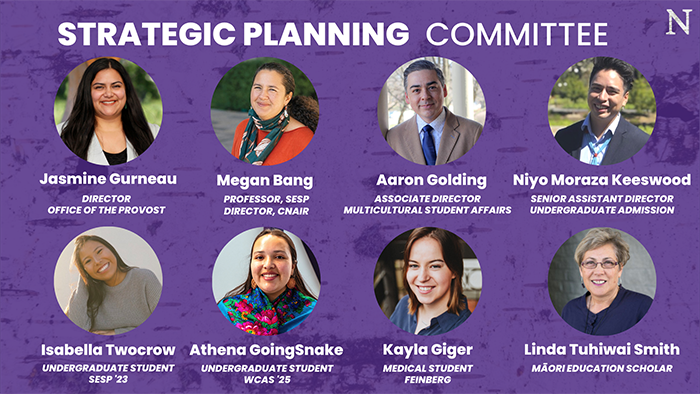
The steps that the Committee will take include the following:
- ASSESS: Where is the University now? We will be gathering data and engaging in conversations with stakeholders within and across the University.
- DEVELOP: Where does the University want to be? We will create our goals, develop a framework, and draft our plan. The process will include socializing the plan with community to collect feedback to finalize the plan.
- EXECUTE: How will the University get there? We will establish deliverables and initiate action steps. This will include a formal launch event and activities.
- MEASURE: How will the University know we are successful? We will develop a plan to monitor progress and measure success regularly. This will include a communication plan to share progress widely.
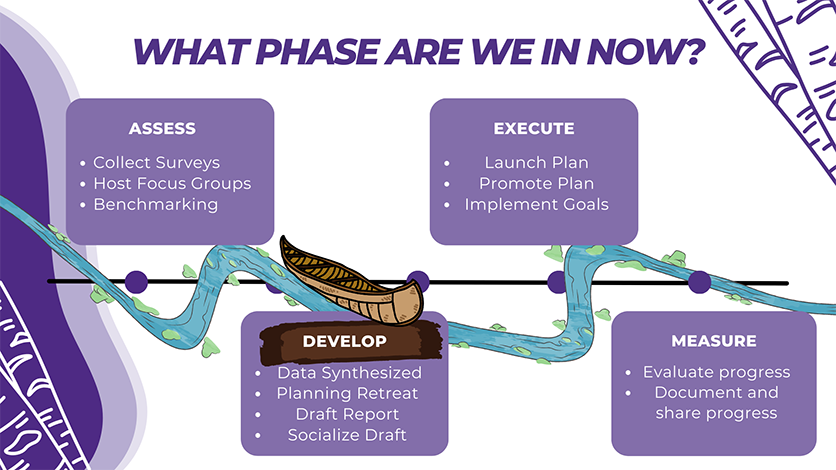

Strategic Plan Background
- Steering Committee
From fall 2021 through spring 2023, the strategic planning and design steering committee received input at multiple stages of the process from internal and external stakeholder and constituent groups through open forums, online surveys and work groups. The committee conducted its work in coordination with the chancellor search process during academic year 2021-22.
After multiple drafts and refinements, the strategic plan process culminated with presentations to and/or endorsements from Faculty Senate, Staff Senate, various UNCW volunteer boards and community groups. On July 27, 2023, the UNCW Board of Trustees approved the revised UNCW mission statement (subject to approval by the UNC Board of Governors) and endorsed the vision statement , pillars and priorities of the new strategic plan.
Implementation
The chancellor and the cabinet provide overall coordination and oversight of the implementation plan, the resource allocation plan, the comprehensive facilities plan, the communications plan the various responsible parties. The strategic plan is a living document, designed to be modified over time, with input from the chancellor, cabinet, deans, other relevant senior officers representatives of constituent groups (such as Faculty Senate, Staff Senate and Student Government Association).
Various groups, offices and individuals work together, across divisions and units, to address the plan’s priorities and objectives. These “responsible parties” are making progress toward achieving the strategic objectives, tracking metrics and managing other details, including progress reporting. They will work with:
- the finance team to develop the resource allocation plans over the next 10 years,
- the campus master planning team and space allocation team regarding facility and space needs,
- human resources about personnel matters,
- the office of university relations regarding the communications plan,
- and the office of institutional research and planning in regard to data management and reporting, assessment, and accreditation-related issues.
Committee Activities
The UNCW Cabinet began implementation of the new Strategic Plan by creating and sorting the list of priorities as shown on the Update Page into three categories: "Highest Priorities for New Strategic Investments," "High Priorities for Planning and Design, Starting the First Year," and "In Progress High Priority Objectives Slated for Continued Emphasis."
The Chancellor and members of his Cabinet finalized the Strategic Plan and presented it for endorsement by the UNCW Board of Trustees in July 2023.
The Strategic Working Groups convened throughout the term to draft revised strategic priorities and actions, preliminary metrics and possible targets. The Steering Committee compiled these items into a final draft version that was ultimately presented as a recommendation for implementation by the Chancellor.
- Chancellor Volety recharged a new Steering Committee, with many members of the original group being asked to continue the work.
- The SDPSC hosted campus-wide workshops collecting stakeholder feedback on the institutional mission, vision, and core values, while gathering perceptions related to the preliminary pillars, priorities, and strategic activities. These data were aggregated and informed the creation of Strategic Working Groups of additional faculty, staff, and students geared toward a specific topic area.
The SDPSC provided incoming Chancellor Volety with a "Strengths and Opportunities" document highlighting the work of the committee in Year 1, with a recommendation to reconvene the Steering Committee for another year with a new charge and timeline.
- The committee reviewed survey results and compiled peer benchmark data related to strategic metrics and initiatives.
- The committee began to formulate elements of a SWOT/SOAR analysis with a goal of presenting findings to the new chancellor in late spring or early summer.
- The committee continued discussions on the peer benchmark study and stakeholder engagement.
- The committee affirmed its commitment to continue the initial stages of the strategic planning process in the wake of Chancellor Sartarelli’s retirement announcement .
- Workshops from strategic planning experts from the Society of College and University Planning (SCUP) on the foundations and design of integrated planning.
- Review progress of existing strategic plan metrics.
- Conversations related to existing strengths and opportunities for campus.
- A draft timeline and list of activities was developed.
- The early stages of forming a robust peer benchmark study to be conducted in fall 2021.
- Extending the current strategic plan through the end of the 2021-22 academic year.
- Discussions with national thought leaders related to design thinking models and strategic planning.
- Provost Jamie Winebrake
- Faculty Senate President Nathan Grove
- Staff Senate Immediate Past Chair Susan Smith
- Identification of members of a Steering Committee comprising members from across campus constituencies representing various roles and units.
Strategic Plan Development Stages
- Environmental Scan and Benchmarking
- Open Forum and Presentation of Data
- Survey of Campus
- Invitation to Participate
- Workgroup 1 - Mission/Vision/Values
- Workgroup 2 - SWOT Analysis
- Discussions with Campus Governance Groups, Open Fora and Call for Input
- Form Workgroups around Strategic Issues (From SWOT)
- Determine Strategic Priorities and Overarching Goals
- Solicit Campus Feedback and Continued Stakeholder Engagement
- Define Strategies and Actions
- Definitions and Baselines
- Yearly Targets
- Solicit Feedback from Stakeholders and Governance Groups
- Discuss Updates to Mission/Vision/Values, Strategic Priorities, Goals, Strategies and Actions
- Incorporate Feedback, Review and Make Edits
- Develop Implementation Plan and Timeline for Review
- Finalize Strategic Plan and Present to Campus
- Gain Endorsement from Campus Governance Groups
Scott Oakes named Vice Dean for Clinical Science Research
Scott Oakes, MD , has been named Vice Dean for Clinical Science Research of the Biological Sciences Division and the Pritzker School of Medicine.
The Vice Dean for Clinical Science Research is a new leadership role accountable for successfully implementing the research strategic plan as it pertains to clinical science within the overall BSD/PSOM research mission. Together with Conrad Gilliam, PhD, the Vice Dean for Basic Science Research, Oakes will play a central role in developing the division’s strategic plans for research. He will report directly to Mark Anderson, MD, PhD, Dean of the BSD and PSOM, and Iris Romero, MD, the Executive Vice Dean for BSD, acting as a strategic leader for the office of the Dean and creating synergy across BSD research entities by working closely with the clinical research Associate Deans and research leaders in clinical departments, the Pritzker School of Medicine, and the University of Chicago Medical Center.
Oakes is a Professor and Vice Chair of Research and Academic Affairs in the Department of Pathology. He is also a Co-Leader of the Molecular Mechanisms of Cancer Program in the University of Chicago Medicine Comprehensive Cancer Center. His research laboratory focuses on how mammalian cells adapt or self-destruct in response to various forms of damage and what goes wrong with this process in cancer and other diseases.
In his role as Vice Chair of Research for the Department of Pathology, he mentors research faculty in the department, supervises pre- and post-award administrators, and oversees searches for new research faculty hires, including four new BSD track faculty in the past four years. He also directs the physician-scientist development program in the Department of Pathology.
Oakes joined the UChicago faculty in 2019, after 14 years on the faculty at the University of California, San Francisco. He earned his undergraduate degree in biochemistry from Elmira College, and his medical degree from the University of Connecticut. He completed his residency at Brigham and Women’s Hospital and a postdoctoral fellowship at Dana-Farber Cancer Institute.

IMAGES
VIDEO
COMMENTS
Mobilize for Impact! also directly considers, and aligns with, Towards Western at 150, the Indigenous Strategic Plan, and plans produced by individual faculties and schools. Unanimously approved by Senate in December 2021, and by Western's Board of Governors in February 2022. Considers 400+ inputs obtained through townhalls, small groups, one ...
Western Research Strategic Plan :: 2022-2027. Introducing Mobilize for Impact! The Western Research strategic plan seeks to mobilize campus to realize a shared vision for research, scholarship, and creative activity - across disciplines, methods, and career stage. It seeks to mobilize supports that enable success - as defined by our community.
Strategic Plan Summary (PDF, 1.4MB) Strategic Plan Overview PowerPoint (PPT, 4.19MB) Facilitation Guide (PDF, 126KB) Milestones and Metrics (PDF, 1MB) Related resources. Indigenous Strategic Plan; Western Research Strategic Plan; Global Engagement Plan; Student Experience Strategic Plan; Mental Health Strategic Plan; Western's Open Space Strategy
TOWARDS WESTERN AT 150 . DRAFT Strategic Plan for Review . Strategic Planning Steering Committee (SPSC) Draft 33 - June 4, 2021 FOR SENATE . ... foundational for all of Western's research, scholarship and creative activities. We will seek out new partnerships both internally and externally, and create a partnership concierge ...
WESTERN ENGINEERING STRATEGIC PLAN |14 Stimulate Research, Scholarship & Creativity Western Engineering brings together brilliant faculty, students and research partners across disciplinary, geographic and cultural boundaries to drive creativity, innovation and change for the better. We are leaders, actively involved in research projects at the
The enrollment management plan prioritizes student success, retention, recruitment, fiscal goals, and inclusivity through expertise, data, and communication. 2. Revitalizing the Marketing Plan. Western's marketing plan aims to target demographics, strengthening the brand, promote diversity, and collaborate for consistent messaging and impact. 3.
The Faculty of Education's 2022-28 Transforming education, transforming lives strategic plan pillars are aligned to the pillars of Towards Western at 150 and select UN Sustainability goals.
Our strategic plan establishes a framework for WFRC over the next five years. Working with national leadership and our broad suite of partners, we have identified the following goals to provide the science and innovation needed to recover, maintain, and sustainably utilize our fish and their aquatic ecosystems: Understand, detect, and reduce ...
WMU strategic plan goals. Ensure a distinctive and supportive learning experience that fosters success. Promote innovative learning, discovery and service. Advance Western Michigan University as a major research university. Ensure a diverse, equitable and inclusive culture and community. Advance economic and environmental sustainability ...
Research at the WFRC focuses on the environmental factors responsible for the creation, maintenance, and regulation of fish populations including their interactions in aquatic communities and ecosystems. Within these pages you will find research information on Pacific salmon; western trout, charr, and resident riverine fishes; desert and inland ...
Western Research Strategic Plan Summary 2022-2027. Western University: Mobilize for Impact!:: 2 GUIDING PRINCIPLES The following four guiding principles are foundational to Western Research's mandate and flow across all we do. These values and touchpoints guide us as we design and implement strategies and develop
Western's new Strategic Plan 2022-32 will cover a span of 10 years and is framed around seven key priority areas; Academic Excellence, Community Building, Diversity, Equity and Inclusion, Internationalization, Research and Creative Scholarship, Sustainability and Well-being. This plan serves as a guide for University strategic investment and ...
In Fall of 2022, Northwestern launched the Native American and Indigenous Strategic Planning process and appointed a Strategic Planning Committee of faculty, staff, and students across the University. The process invited many voices into the highly collaborative process. Strategic planning question: In the next five years, what do we need to do ...
About our Planning. From September 2020 to April 2021, Western engaged students, faculty, staff, alumni, and community partners in developing this plan. Through interactive Zoom sessions, online surveys, and written submissions, we received more than 3,700 inputs. Thank you to the 37-member Strategic Plan Steering Committee for this important work.
School of Medicine's strategic plan encompassing 2021-2026. A strategic plan should have its base and evolve with the times. In fall 2020, school leaders, basic science chairs and department representatives developed the plan's . outline and first draft. Then, to ensure the successful implementation of the plan,
The Purpose. Strategic Planning evolves from collaborative engagement with the campus, local, and regional communities to articulate a shared mission, vision, and set of values that drive all decision-making at Arizona Western College. The Strategic Plan that develops out of this process is dynamic and provides a flexible but focused framework ...
Leading the World in Discovery and Innovation, STEM Talent Development and the Delivery of Benefits from Research - NSF Strategic Plan for Fiscal Years (FY) 2022 - 2026. Available Formats: PDF Document Type: Reports. Document Number: nsf22068 Public Comment: Document History: Posted: March 28, 2022.
ORD Strategic Goals. ORD has identified four overarching goals to guide its work. The goals are: Goal 1: Advance Science and Technology. Improve protection of human health and the environment through scientific advancements, innovative research, and technology development using systems-level approaches. Goal 2: Support Decision Making.
Research Roadmap Goals. Three strategic goals will enable us to propel our research enterprise to new heights: Goal #1: Build, improve, and maintain state-of-the-art research facilities, equipment, data, and technology to enable success. Goal #2: Grow Carolina research by identifying and investing in strategic opportunities, leveraging existing ...
Firmly rooted in the University's most recent institutional plan, Engaging the Future, the Strategic Research Plan seeks to: identify specific areas of existing and emerging research strength atWestern; guide the recruitment, training and retention of highly qualified faculty, students and postdoctoral fellows, and staff;
September 2022- Launch of Native American and Indigenous Strategic Planning Process. It's been almost nine years since the Native American Outreach and Inclusion Task Force Report was published in 2014 and Native American and Indigenous initiatives continue to grow and evolve at Northwestern. In Fall of 2022, Northwestern launched the Native ...
Western Fisheries Research Center 2023-2027 Strategic Plan Message from the Director. Now more than ever society needs strong science to guide decision making. The combined impacts of rapid climate change and unwavering human population growth are threatening our natural resources and humanity.
Strategic Plan Background. From fall 2021 through spring 2023, the strategic planning and design steering committee received input at multiple stages of the process from internal and external stakeholder and constituent groups through open forums, online surveys and work groups. The committee conducted its work in coordination with the ...
The Vice Dean for Clinical Science Research is a new leadership role accountable for successfully implementing the research strategic plan as it pertains to clinical science within the overall BSD/PSOM research mission. Scott Oakes, MD, has been named Vice Dean for Clinical Science Research of the Biological Sciences Division and the Pritzker School of Medicine.
Associate Dean, Research ; 5. TCOM shall incorporate into its strategic plan tactical initiatives to encourage and support the conduct of research and scholarly production. Such initiatives shall include collaboration across the HSC and be in alignment with the mission of the college and the HSC. Associate Dean, Research TCOM Department Chairs